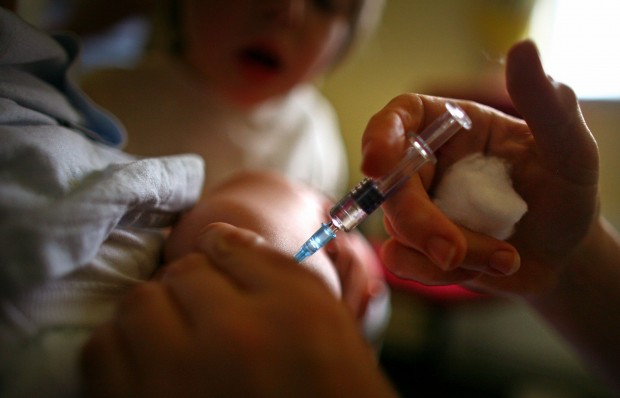Garvin's son is 9 years old and just transferred into a new school in Sacramento, a public school with a private school name: Alice Birney Waldorf-Inspired K-8. Our chart includes data over a seven-year period, from the 2007-2008 school year to the 2013-2014 school year, the most recent for which data are available. The PBE rate at Alice Birney during that stretch has ranged from 24 to 33 percent, meaning in the best year, only about three-fourths of children are vaccinated.
If you're wondering what a preferred vaccination rate is, officials would love to see it as close to 100 percent as possible.
Garvin said he and his wife made a conscious decision to go to this school, but "it never occurred to me to check the vaccination rate," he told me.
His major question was what the low vaccination rate at the school meant to the health of his son. The state's own tool to assess vulnerability of a school showed that Alice Birney's low vaccination rate put it in the "most vulnerable" category. If a disease is introduced into a community with such a low vaccination rate, there is danger it would spread -- and fast.
So what should Garvin do? He says both his children, his 9-year-old and an older son in high school, are up to date for all recommended vaccines. He also said they are healthy, with no chronic conditions.
Gil Chavez, state epidemiologist with the California Department of Public Health, was reassuring. "As long as children are up to date on vaccines," he said, "they should be protected against vaccine-preventable diseases."
But for those kids who are not vaccinated, the risks are great. California saw a measles outbreak earlier this year and a high percentage of the cases occurred in people who were intentionally unvaccinated. In 2010, a whooping cough epidemic swept across California. Ten infants died. Babies cannot be vaccinated against whooping cough until they are 2 months old and are reliant on the blanket of protection from all the rest of us being vaccinated. Later research showed that vaccine refusal fueled the epidemic.
In the event of an outbreak, the first thing health officials do is determine who is vaccinated and who is not. Dr. Olivia Kasirye, health officer for Sacramento County, says the county health department is aware of the handful of schools with low vaccination rates.
"Parents need to be aware that if there is a situation with an outbreak, that they can be required to keep their child out of school until the outbreak is over," Kasirye said. That could be two weeks, perhaps more, depending on the disease.
Gabe Ross, spokesman for the Sacramento City Unified School District, said that it's the district's goal to have "a 100 percent immunization rate."
"We work hard at the schools with higher op-out rates to make sure that parents truly understand the issue, truly understand the risk with their kids and are making informed decisions," he said.
Considering Opt-Out Rates in Advance
Now let's take it back a step. What about parents who have school choice and are looking at schools? "A lot of people want to know the test scores before they (select a school)," Garvin said. "I feel like (the PBE rate) is something you should know before you go."
Of particular note are parents of children who do have a chronic health issue. How much should a school's PBE rate matter to them? "It's hard to give a blanket answer in a situation like that," Kasirye told me, "but definitely one thing would be to talk to a health care provider and say 'I'm considering this school and this is what I've found out, what are your thoughts.' "
Berkeley pediatrician Olivia Lang has faced that exact issue. Her practice no longer accepts families that refuse all vaccinations for their children. She stressed that she could not make school decision for parents, but did share her medical opinion. "I've had parents worry about a school with a 35 percent opt-out rate," she said. "They say, 'Does this pose a risk to my child?' And I've said, 'Yes, it does.' I've had families who've chosen not to attend a certain school because of that."
Since the state publishes these data, it's become easier for families to take the opt-out rate into account. Dr. James Watt, chief of the communicable disease branch at the California Department of Public Health, said he hopes that greater awareness of high opt-out rates will "spark a discussion" at the school level.
Medical vs. Personal Belief Exemption
One final note: There are two types of exemptions from vaccines.
Some children have medical conditions, and vaccines may be detrimental to their health. In California, these children may receive a medical exemption from their physician. In 2013-2014, 0.19 percent of children had permanent medical exemptions.
But a personal belief exemption, or PBE, is different. This is a signed statement from a parent indicating that vaccines are against his or her personal beliefs. Last year in California, 3.15 percent of children had such an exemption.
